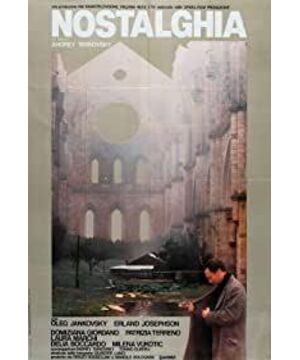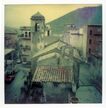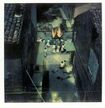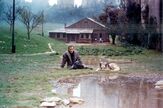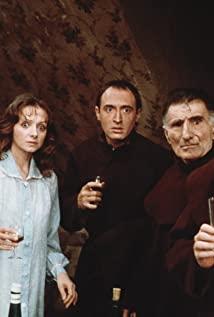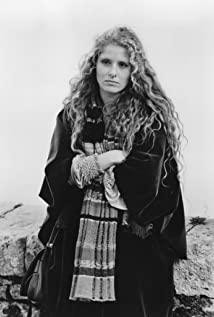Andrei Tarkovsky is a film director with poetic temperament, his films have a poetic temperament that is different from secular Hollywood films. During the second half of Tarkovsky's life, there was an increasing suspicion and critique of traditional film language, the function of montage, color and musical effects. As a result, in his later works, background music was used less and less. In his last film "Sacrifice", all background sounds came from live sound sources, and Bach's music was only used in the subtitles at the beginning and end of the film.
As for the content of "Nostalgia", I am bluntly speaking, before watching this film, I have read a lot of introductions to the director and other people's understanding of the film, but I am still at a loss when watching the film, unable to have my own clear context. . Noticing only a few pieces of music in it, and just flipping through the pieces of music over and over again...and doing a relatively shallow analysis of the music in it.
In the film "Nostalgia", music is only used in about eight scenes, but they are all extremely subtle and delicate...
At the beginning of the film, a labor scene with a Russian flavor comes into view. A Russian woman inadvertently sings a little song with a Russian style. This little song is basically the musical clue that runs through the whole film, and this Russian song is one of the few songs in the film. The most repeated piece of music that can be counted, occupies three of the eight musical scenes. The first place is the beginning of the film, accompanied by subtitles, this piece of music is gradually transformed from a voice source in the mouth of a Russian woman working in the field into a voice-over of instrumental music. The second time, shortly after the beginning of the film, the male protagonist standing in the rain fell into the illusion of intertwined memories and the present, seeing his wife and his ambiguous female interpreter hugging each other, crying, comforting, vague Russian ditty It was at this time that it reappeared. If you listen carefully, it is still the singing of Russian women. The third time is the long shot that seems to have the best of both worlds and a perfect state given at the end of the film. The poet sits in the background of an ancient building. There seems to be a woman crying in the distance, and then it gradually becomes clear that it is still the beginning of the film. That Russian ditty. The camera changes, the poet arrives in such a paradise after his death, and he lives in a wood cabin in his hometown surrounded by towering buildings that symbolize the protection of grace. . . . At the end of the film, the subtitle appears: "This film is in memory of my mother".... This is a piece of theme music with a certain symbolic function and a certain philosophical feeling. Judging from its symbolic meaning, this piece of music plays a role in portraying characters and is a symbol of mother and hometown; from its Russian tone, it sets the tone for the style of the film and expresses certain national characteristics, local colors, It expresses a sense of nationality and highlights the suggestion of "nostalgia" in the theme of the film.
In the film, there are two abrupt in-voices that can be found on-camera, and both use Beethoven's Ninth Symphony.
The first paragraph appears when the old man visits the poet for the first time and enters his residence. The two seem to have the same feeling in a space full of water. The poet turned on the radio, and the gorgeous, plump sound of Beethoven's Ninth Symphony filled the simple, cold space, and after a while, it stopped abruptly...
The second time, at the end of the film, the old man speaks to the public in Rome and sets himself on fire to warn the world. When he stood on the ancient statue and preached his eschatological view to the standing people of His Royal Highness, all the golden walls were brilliant in the light of dusk, and people stood on the stone steps like pillars, and a despicable clown was trying his best to abet the old man to hurry up Fulfill the promise of self-immolation. Before the old man set himself on fire, he shouted, "Music, music...", but the tape recorder did not respond at all like the numb neighbors around him. Suddenly, Beethoven's "Ode to Joy" whimpered and roared on the tape recorder, and the audience watched the old man flutter in the flames in a daze... Obviously, this scene was ritualized, and it definitely expressed Tarkov. Skye pointed to the numbness and sadness of the world and a will to save oneself compared to the old.
Here, it is also worth mentioning that the only piece of music in the film that is really used to add to the atmosphere. When the poet Bingzhu finally passed the candle flame from one end of the pond to the other end of the pond, a smile appeared on his face, but he died suddenly because his heart could not support it, also with a fragment from Beethoven's Ninth Symphony as the background. This piece of music appears as a silent source music, which has a certain symbolic meaning. The poet expresses his piety in the form of holding a candle and wading through the pond, and expresses the process of spiritual leap and ascension. As the only music in this film used to exaggerate the atmosphere, at first glance, it appears a bit abrupt, but after careful consideration, the director, the old man or the poet are all in a very depressed mood. I understand that death is probably this kind of mood The best relief. In fact, the death of the protagonist in the film and the death of Tarkovsky, the director of the film, also explain this.
From the musical details of Beethoven's Ninth Symphony used in the above three clips, it is not difficult to see the director's preference for Beethoven's peak work. The last movement of this symphony, "Ode to Joy," describes the lofty realm of "Hugging, millions of people," and "brothers in the world" shining with the light of freedom, equality and fraternity. A lifelong ideal. The breadth and depth of this symphony is unparalleled. Here lies the composer's concern for the ultimate value of human beings, his thinking and longing for God, the universe, nature and the world. The symphony's outer frame contains profound philosophy and moving momentum. The fusion creates a sense of sacred sublime and a joyous ode from the heart. The director of the film, Tarkovsky, also has a persistent and deep concern for the human spirit. He once admitted that his deepest concern was: "The spiritual space in our culture is barren. We expand the realm of material wealth, but we deprive people of their spiritual dimension and ignore their threats." However, he was convinced that "a person To be able to restore his covenant with the source of his own soul, thereby restoring his relationship to the meaning of life. And the way to regain moral integrity is to give oneself in sacrifice."
Understanding Ode to Joy and Tarkovsky's Thought It is not difficult to understand why the director prefers Beethoven's Ninth Symphony in Nostalgia so much.
There are also two places where the music is indistinct, even if you try to listen to it to be able to identify it. Both are descriptive illusions. The first place appeared after the old man quarreled with the female translator beside him. The old man had a vision of his wife in his mind, and the inexplicable music was mixed with the sound of bells and footsteps. Another place still appeared in the vision of the old man, in the fog, under the tree, his son, daughter, wife, mother inexplicably changed positions in the unclear music. In these two places, the music and the picture are in a parallel state, which sets off, expresses and assists each other to describe the hallucinations of the old man.
The entire film ends with very little music. I still haven't been able to deeply understand "Nostalgia", so I started with the little music...
Source: ( http://blog.sina.com.cn/s/blog_5f8212360100ju1x.html ) - Music Critic【 Nostalghla]_Guapi cc_Sina Blog
View more about Nostalghia reviews


